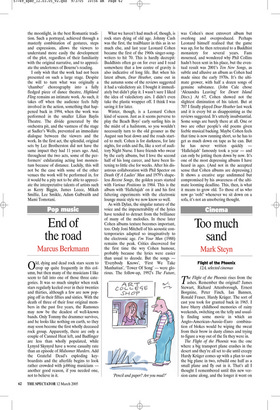End of the road
Marcus Berkmann
Old, dying and dead rock stars seem to crop up quite frequently in this column, but then many of the musicians I like seem to fall into one of those three categories. It was so much simpler when rock stars regularly keeled over in their twenties and thirties, although a few are now popping off in their fifties and sixties. With the death of three of their four original members in the past five years, the Ramones may now be the deadest of well-known bands. Only Tommy the drummer survives, and he looks like nothing on earth, so they may soon become the first wholly deceased rock group. Apparently, there are only a couple of Canned Heat left, and Badfinger are less than wholly populated, while Lynyrd Skynyrd have a worse casualty rate than an episode of Midsomer Murders. Add the Grateful Dead’s exploding keyboardists and the afterlife begins to look rather crowded with jobbing musicians another good reason, if you needed one, not to believe in it. What we haven’t had much of, though, is rock stars dying of old age. Johnny Cash was the first, the trailblazer in this as in so much else, and last year Leonard Cohen became the first of the 1960s singer-songwriters to hit 70. This is hardly decrepit: Buddhists often go on for ever and I read somewhere that a low centre of gravity is also indicative of long life. But when his latest album, Dear Heather, came out in the autumn some of the reviews suggested it had a valedictory air. I bought it immediately but didn’t play it. I wasn’t sure I liked the idea of valedictory airs. I didn’t even take the plastic wrapper off. I think I was saving it for later.
Winter, though, is a Leonard Cohen kind of season. Just as it seems perverse to play the Beach Boys’ early surfing hits in the midst of a hailstorm, so you wouldn’t necessarily turn to the old groaner as the August sun beat down and the roads started to melt. Cohen is for darkness, for late nights, for colds and flu, like a sort of auditory Night Nurse. I have friends who swear by the early albums, but I love the second half of his long career, and have been listening to little else for weeks. After his disastrous collaboration with Phil Spector on Death Of A Ladies’ Man and 1979’s shapeless Recent Songs, the golden years started with Various Positions in 1984. This is the album with ‘Hallelujah’ on it and his first faltering experiments with the electronic lounge music style we now know so well.
As with Dylan, the singular nature of the voice and the impenetrability of the lyrics have tended to detract from the brilliance of many of the melodies. In these later Cohen albums texture becomes important, too. Only Joni Mitchell of his acoustic contemporaries adapted so imaginatively to the electronic age. I’m Your Man (1988) remains the peak. Critics discovered for the first time the wry Cohen humour, probably because the lyrics were easier than usual to decode. But the songs — ‘Everybody Knows’, ‘First We Take Manhattan’, ‘Tower Of Song’ — were glorious. The follow-up, 1992’s The Future, was Cohen’s most extrovert album but overlong and overproduced. Perhaps Leonard himself realised that the game was up, for he then retreated to a Buddhist monastery for several years. Fans mourned, and wondered why Phil Collins hadn’t been sent in his place, but the eventual result was 2001’s Ten New Songs, as subtle and allusive an album as Cohen had made since the early 1970s. It’s the ultimate grower, with half a dozen songs of genuine substance. (John Cale chose ‘Alexandra Leaving’ for Desert Island Discs.) At 67, Cohen showed not the slightest diminution of his talent. But at 70? I finally played Dear Heather last week and it is every bit as disappointing as the reviews suggested. It’s utterly insubstantial. Some songs are barely there at all. One or two are other people’s old poems given feeble musical backing. Maybe Cohen feels that time is now running short, so he has to get as much down on tape as he can. But he has never written quickly — ‘Hallelujah’ famously took a year — and can only be jotting them down by now. It’s one of the most depressing albums I have heard in ages. (And not in the accepted sense that Cohen albums are depressing.) It shows a creative urge undimmed but compromised by his awareness of the ultimate looming deadline. This, then, is what it means to grow old. To those of us who now go ‘ooh!’ whenever we sit down on a sofa, it’s not an unsobering thought.
































































 Previous page
Previous page